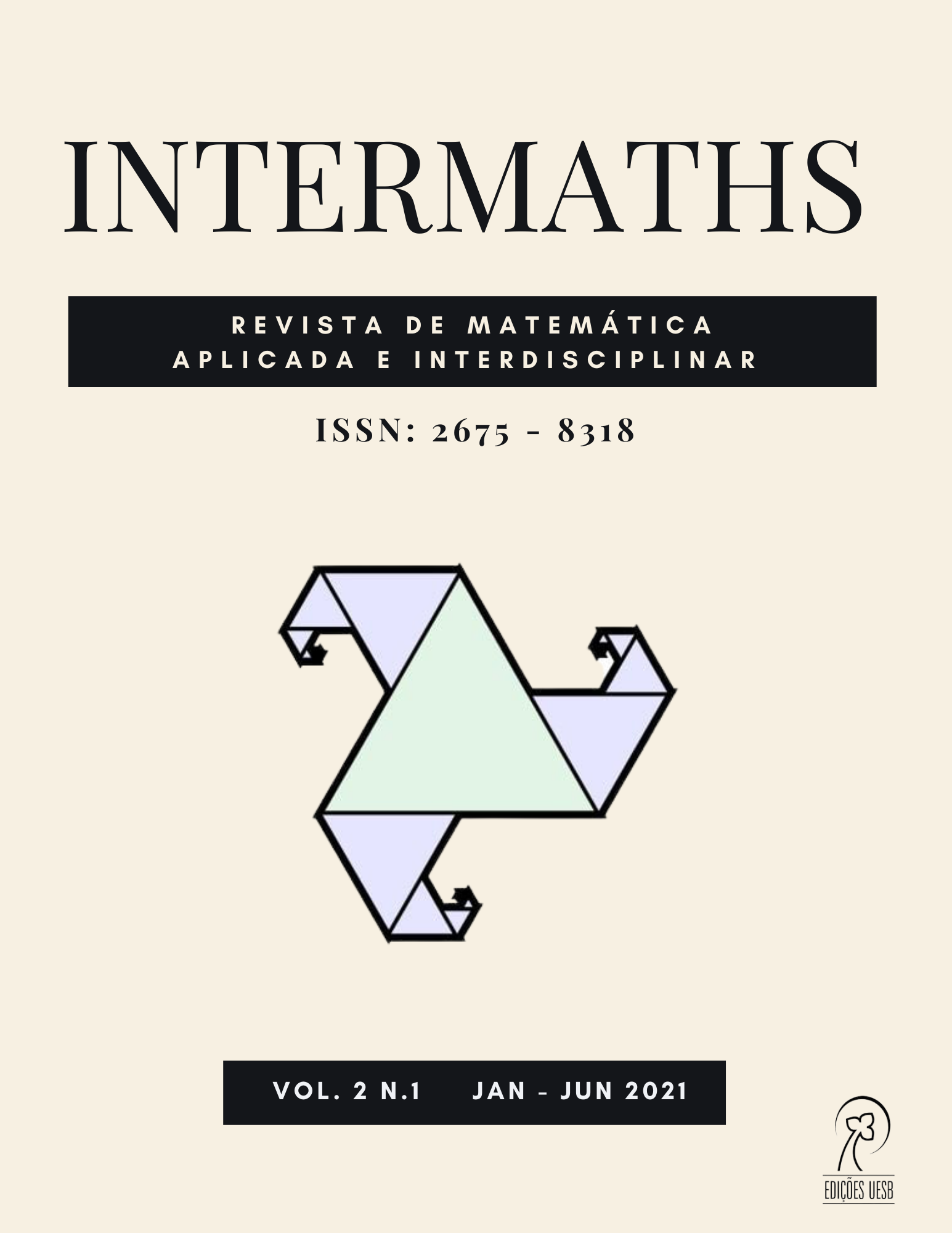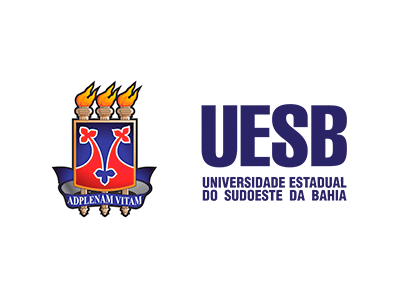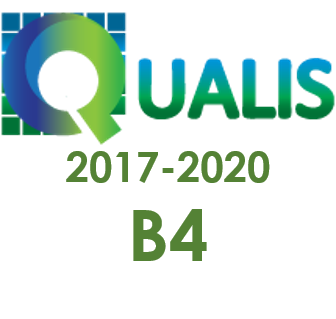Imaginação Pedagógica, Educação Matemática e Inclusão: em busca de possibilidades para aulas de Matemática
DOI:
https://doi.org/10.22481/intermaths.v2i1.8595Palavras-chave:
Educação Matemática, Formação de Professores, Ensino de Geometria, Educação InclusivaResumo
Este artigo traz reflexões sobre o processo de Imaginação Pedagógica, no qual licenciandos em Matemática imaginaram aulas de Matemática em uma perspectiva inclusiva, durante a participação em um grupo de estudos sobre Educação Matemática e Inclusão. O grupo foi organizado em dois momentos. O primeiro deles foi destinado a leituras e discussões sobre Educação Inclusiva. No segundo momento, os participantes se dedicaram à imaginação de aulas de Matemática sob a ótica da inclusão, para turmas em que estivessem presentes, ao menos, um estudante com deficiência. No exemplo aqui analisado, as aulas visavam trabalhar um conteúdo de geometria, com uma turma do 2º ano do Ensino Médio. A discussão acerca do processo de Imaginação Pedagógica teve como base as descrições dos elementos imaginados: a escola, as turmas, os alunos e as aulas. Para compor estes elementos, os participantes se basearam nas experiências de vida compartilhadas por cada um. As aulas imaginadas tinham como características a realização de atividades investigativas em grupos e a interação entre os estudantes. A Imaginação Pedagógica possibilitou que os futuros professores pudessem pensar em caminhos para que as aulas de Matemática sejam mais inclusivas e desenvolvessem um olhar mais atento e aberto às diferenças.
Downloads
Metrics
Referências
Brasil, Ministério de Educação e Cultura. Lei nº 9394/96, de 20 de dezembro de 1996. Estabelece as diretrizes e bases da Educação Nacional - LDB. Brasília: MEC, 1996.
Brasil, Ministério da Educação. Secretaria de Educação Especial. Política Nacional de Educação Especial na Perspectiva Inclusiva. Brasília, DF: MEC/SEESP, 2008.
Brasil, Decreto nº 7.611 de 17 de novembro de 2011. Dispõe sobre a educação especial, o atendimento educacional especializado e dá outras providências. Brasília: Casa Civil, Subchefia para Assuntos Jurídicos, 2011.
Brasil, Lei 13.146, de 6 de julho de 2015. Institui a Lei Brasileira de Inclusão das Pessoas com Deficiência (Estatuto da Pessoa com Deficiência). Brasília: Secretaria Geral, Subchefia para Assuntos Jurídicos, 2015.
M. Penteado, F. Marcondes, C. Nogueira e L. Yokoyama, Difference, inclusion and mathematics education in Brazil. In: A. Ribeiro, L. Healy, R. Borba and S. Fernandes (Eds.). Mathematics education in Brazil. Cham, Switzerland: Springer, 2018, pp. 265–278. https://doi.org/10.1007/978-3-319-93455-6
O. Skovsmose, Inclusions, meetings and landscapes. In D. Kollosche, R. Marcone, M. Knigge, M. Penteado and O. Skovsmose (Eds.), Inclusive mathematics education: State of the art research from Brazil and Germany Cham. Switzerland: Springer, 2019. pp. 71-84.
J. Prais e V. Rosa. A Formação de professores para inclusão tratada na Revista Brasileira de Educação Especial: uma análise. Revista Educação Especial. Santa Maria. Vol. 30, nº 57 pp. 129-144. Jan. / Abr. 2017. http://dx.doi.org/10.5902/1984686X19833
O. Skovsmose and M. Borba. Research methodology and critical mathematics education. In P. Valero and R. Zevenbergen (Eds.) Researching the socio-political dimensions of mathematics education: Issues of power in theory and methodology. Dordrecht: Kluwer Academic Publishers, 2004. pp. 207-226.
O. Skovsmose, Researching possibilities. In M. Setati, R. Vithal, C. Malcolm and R. Dhunpath (Eds.), Researching possibilities in mathematics, science and technology education New York: Nova Science Publishers, 2009. Reprinted as Chapter 9 in Skovsmose, O. Critique as uncertainty. Charlotte: Information Age Publishing, 2014. pp. 105-119.
O. Skovsmose. Critique, generativity, and imagination. For the Learning of Mathematics, New Brunswick, Canada. vol. 31, nº 3, pp. 19-23, 2011.
O. Skovsmose, Uncertainty, pedagogical imagination, explorative reasoning, social justice, and critique. In S. Mukhopadhyay and B. Greer (Eds.), Proceedings of the Eight International Mathematics Education and Society Conference Vol. 1. Ooligan Press, Portland State University, 2015, pp. 111-124.
C. Murphy and D. Lick, Whole Faculty Study Groups: A powerful way to change schools and enhance learning. Califórnia: Corwin, 1998.
A. Moura. O encontro entre surdos e ouvintes em cenários para investigação: das incertezas às possibilidades nas aulas de Matemática. Tese de doutorado. Instituto de Geociências e Ciências Exatas, Unesp, Rio Claro, Brasil, 2020. http://hdl.handle.net/11449/192015
O. Skovsmose, Cenários para investigação. Bolema, vol. 13, nº 14, p. 66-91, 2000. https://www.periodicos.rc.biblioteca.unesp.br/index.php/bolema/article/view/10635
V. Capellini, O direito de aprender de todos e de cada um. In: M. Moraes e E. Maranhe (Org.), Introdução conceitual para a educação na diversidade e cidadania. Bauru: Ed. UNESP-SECAD-UAB, v.2, 2009.
B. D'Ambrósio e C. Lopes, Insubordinação Criativa: um convite à reinvenção do educador matemático. Bolema [online]. vol. 29, nº 51, pp.1-17, Abr. 2015. https://doi.org/10.1590/1980-4415v29n51a01.
CAST. Universal Design for Learning Guidelines, version 2.0. Wakefield, MA: Author, 2011.
Downloads
Publicado
Como Citar
Edição
Seção
Licença
Copyright (c) 2021 INTERMATHS

Este trabalho está licenciado sob uma licença Creative Commons Attribution 4.0 International License.
 All content of Revista INTERMATHS/Journal INTERMATHS is licensed under a Creative Commons - Atribuição 4.0 Internacional (CC-BY 4.0).
All content of Revista INTERMATHS/Journal INTERMATHS is licensed under a Creative Commons - Atribuição 4.0 Internacional (CC-BY 4.0).







